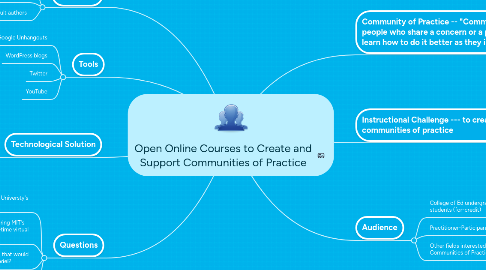Open Online Courses to Create and Support Communities of Practice
Door Dorothy Crissman


1. Resources
1.1. Eva Perry Mock Printz Book Club
1.1.1. Project specifications
1.1.2. End User requirements
1.1.3. Action points sign-off
1.2. Former ECI 521 students
1.2.1. Define actions as necessary
1.3. Young Adult authors
2. Tools
2.1. MIT's Google Unhangouts
2.2. WordPress blogs
2.3. Twitter
2.4. YouTube
3. Technological Solution
3.1. Design a MOOC
3.1.1. Materials
3.1.2. Personel
3.1.3. Services
3.1.4. Duration
3.2. Extend the MOOC so the community continues . . .
3.3. Create a real-time meeting tool and protocol that engages students/practitioners in critical thinking about important issues
4. Questions
4.1. How might this fit into Universty's MOOC Plan?
4.2. Would there be interest in exploring MIT's Unhangouts for interactive real-time virtual classes?
4.3. Other fields/disciplines that would benefit from such a model?
4.4. Model would be MOOC + Ning for continuous support of Communities of Practice. Does that make sense?
5. Community of Practice -- "Communities of practice are groups of people who share a concern or a passion for something they do and learn how to do it better as they interact regularly." -- Etienne Wenger-Trayner
6. Instructional Challenge --- to create communities of practice
6.1. To connect novices and practitioners for mutual benefits
6.2. To better prepare beginning teachers
6.3. To help practicing teachers keep current in theory and practice
6.3.1. Included
6.3.2. Included
6.3.3. Excluded
6.4. To promote the College of Ed as a valuable resource for schools
6.5. To extend this model to other fields where it's desirable to create and maintain communities of practice
7. Audience
7.1. College of Ed undergrad and grad students (for-credit)
7.1.1. Dependencies
7.1.2. Milestones
7.2. Practitioner-Participants (Not-for-credit)
7.2.1. Schedule
7.2.2. Budget
